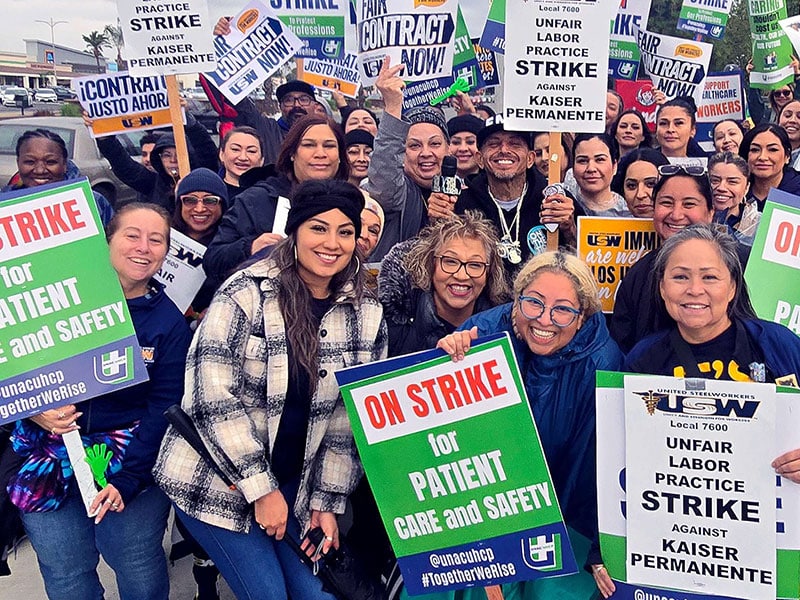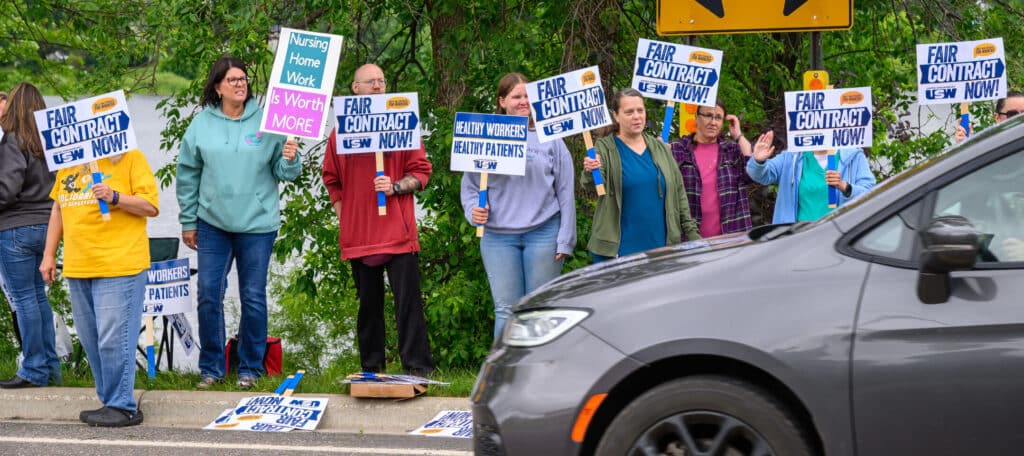USW submits comments to CMS on urgent need for safe staffing levels
For the past several weeks, the USW Health Care Workers Council has been collecting testimonies from union members across the sector about how staff turnover and other staffing issues impact your working conditions and continuity of care.
Thanks to this vital feedback and stories regarding safe staffing, the USW was able to submit commentary, including direct quotes from members, to the Centers for Medicare & Medicaid Services (CMS) as they request input from workers to help establish mandatory minimum staffing requirements.
In our submission, the union outlined how employers continue to pocket profits while refusing to address turnover and retention issues.
“I remember residents having to wait [half] an hour to be able to receive assistance to get to the bathroom. It was terrible,” noted USW member Judith Ackerman. “Then, when we won a new contract, one of the first parts to it was a lowering the number of residents per aide. Things improved immensely.”
The USW urged CMS to establish mandatory minimum staffing levels in the long-term care sector for all direct care job classifications.
The full text of the commentary is below or you can click here to read a printable version of the full commentary.
June 9, 2022
Filed Electronically: regulations.gov
RIN 0938-AU76 / Docket ID: CMS-1765-PRE: United Steelworkers comments on CMS’s Request for Information on “Revising the Requirements for Long-Term Care Facilities to Establish Mandatory Minimum Staffing Levels” (CMS-1765-P)
To Whom It May Concern:
These comments are submitted on behalf of the 850,000 members of the United Steel, Paper and Forestry, Rubber, Manufacturing, Energy, Allied Industrial and Service Workers International Union (United Steelworkers or USW). We appreciate the opportunity to comment on the proposed rule issued by the Centers for Medicare & Medicaid Services (CMS), Department of Health and Human Services (HHS) on April 15, 2022 relating to the request for information on revising the requirements for long-term care facilities to establish mandatory minimum staffing levels.
As a union representing more than 50,000 health care workers, including workers in nursing homes, assisted-living facilities, and those who provide in-home care, we know the tremendous challenges and chronic staffing shortages that these workers have faced since long before the pandemic began. These essential workers, who provide critical care to some of our country’s most vulnerable populations, are grossly underpaid, have limited support, and face round the clock shifts for a job that has, and continues to be, undervalued by their employers, and by the nation as a whole. For far too long the industry has put profits over people, underpaying and overworking staff at the expense of vulnerable residents.
USW firmly believes that any safe staffing policies put into place must allow for adjustments upward based on the acuity of care needed, but also ensure that any changes to the policy are the result of a joint decision between labor and management. It is imperative that workers and their representatives have a seat at the table, and that these policies encompass all job classes of direct care from certified nursing assistants and licensed practical nurses to registered nurses and recreational therapists. These safe staffing policies should also include a minimum time for administrative nursing in addition to direct care.
For over two decades, private equity has rapidly increased investments in the long-term care sector, consolidating ownership and shifting funds away from nursing staff and resident care in order to ensure maximum profit. That is why we applaud the CMS for finally proposing much needed action in this sector, ensuring that these employers, who routinely have poor records of care, put the needs of their residents first by adopting mandatory minimum staffing levels that guarantee adequate levels of care.
According to one USW member, incentive pay for employees led nurses to sign up for extra shifts, keeping their long-term care facility from being short staffed. But the program ended when the company needed to stay under budget, and management began receiving bonuses for doing so. “It’s so hard on us when we are short staffed – families get upset because their loved ones don’t get properly cared for and we have to answer to them,” shared the USW member, “We are not allowed to tell patients or family we are short staffed. Therefore, it makes us look like we are lazy or can’t keep up with our workload. We also have more falls.”
Adequate staffing has a direct impact on the quality of care that residents and patients receive at these facilities. According to the Joint Commission on Healthcare, in the state of Virginia alone, “more than 60 percent of facilities with low staffing receive poor health inspection ratings, which include criteria such as medication management and resident quality of life.” And according to a study published in the Gerontological Society of America, when nurse aides are not able to report for work and adequate staffing is not available, nursing homes perform poorly on each quality measure studied.
According to one USW member in long-term care, “Safe staffing would mean residents get the care they deserve and pay for. Short staffed units lead to delayed cares, extended wait times for basic needs and daily cares and inexperienced staff cutting corners to finish tasks. Being dependent on others for all of your needs and having very little say in how and when those needs are met, day in and day out, can contribute to depression and failure to thrive [for residents].”
According to another USW member, “Short staffing has affected myself, the fellow staff, and most importantly our residents. A 1 staff to 30 residents [ratio] has become a common practice at our work place. Residents are not getting showered as they should be. They are missing out on essential restorative services because, yet again, the employee in that position has to work the floor. I have cried with residents and families. Complained to my state officials but my voice is not heard or validated. I am speaking on behalf of the people with no voice.”
As workers continue to leave the sector for less strenuous, safer, and higher-paying jobs, the quality of care at these facilities continues to be compromised, putting the lives of some of our most vulnerable seniors at risk. Those workers that remain in long-term care are met with not only increased workloads, but with greater physical and emotional stress, all of which results in inadequate resident care.
As one USW member and Certified Nursing Assistant shared, “We are tired, over worked, and resident care is being affected, especially on our behavioral unit where I work. More incident reports are happening (at the discretion of the nurse and supervisor). [Assistant Directors of Nursing] and office staff get overtime to meet nursing hours but are not giving nursing care. Posted staff schedule has nursing staff assigned to units that don’t work the units. It’s only for show. We are operating below bare minimum when it comes to direct nursing care. Employees have decided to leave and pursue employment elsewhere due to the stress administration is putting upon us.”
And all the while, employers continue to pocket profits, refusing to address turnover and retention issues by offering competitive wages, creating consistent shifts, and providing opportunities for professional growth. Instead of turning these positions into family-sustaining careers, employers are exacerbating this longstanding industry problem.
“[Workers] are not staying because inadequate staffing leads to being forced over extra hours and it’s hard to find a baby sitter to watch your children 16 hours,” according to one USW member in long-term care. “The [workers] who show up every day are almost punished by the short comings of staff who call off regularly. The turnover rate is insanely high…”
It is also important to note that women account for over 80 percent of the long-term care workforce, and over half of these women are women of color. For far too long these workers have faced systemic racism and gender injustice that has prevented them from attaining family-sustaining wages and working conditions.
As USW member Judith Ackerman shared, “When I was a recreational therapist at Florence Nightingale, which no longer exists, we constantly fought with the administration. One of our union reps said ‘look, you can’t wipe two behinds at the same time’ in describing the problem of too few aides. I remember residents having to wait [half] an hour to be able to receive assistance to get to the bathroom. It was terrible. Then, when we won a new contract, one of the first parts to it was a lowering the number of residents per aide. Things improved immensely.”
In solidarity with long-term care workers everywhere, USW urges CMS to establish mandatory minimum staffing levels in the long-term care sector for all direct care job classifications. We look forward to engaging with CMS as they work toward such vital regulations, and ensuring that workers and their representatives have a voice at their workplaces.
Sincerely,
Anna Fendley
Director of Regulatory and State Policy
By clicking Sign Up you're confirming that you agree with our Terms and Conditions.
Recent News Articles
Want to Learn More?
See how the USW is making a real difference in our communities and our workplaces.

